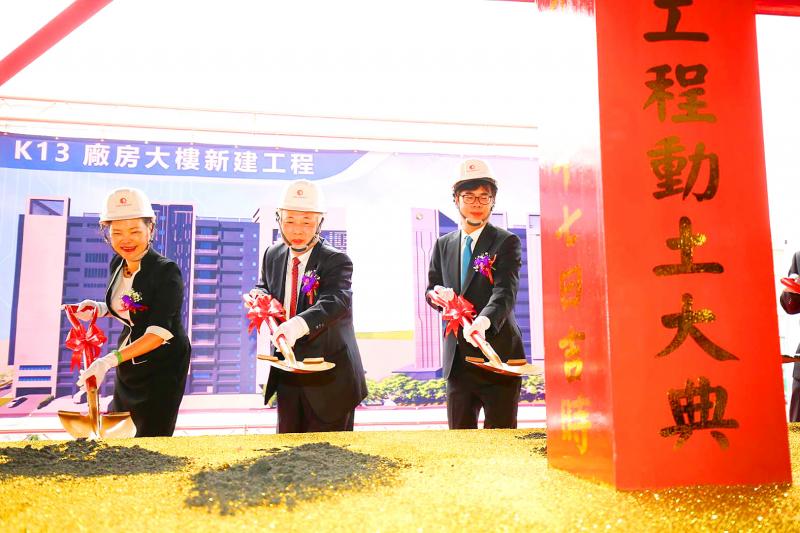ASE Technology Holding Co (ASE, 日月光投控), the world’s biggest chip tester and packager, yesterday said it would invest NT$26 billion (US$880.58 million) in a new fab in Kaohsiung to expand advanced testing and packaging capacity for 5G-related chips.
The new fab, code-named K13, is part of the company’s broader plan to build six fabs in Taiwan within five years, ASE said.
As rapidly developing 5G technology is stimulating demand for semiconductors, ASE said it is stepping up investment and adding advanced technology capacity to capture the “explosive” growth of the supply chain.

Photo: Lee Hui-chou, Taipei Times
“5G is a new technology, which is to bring explosive growth to businesses. ASE would continue to invest in advanced process technologies and hire research and development experts in Kaohsiung to capitalize on this opportunity for the semiconductor industry,” ASE chief executive officer Tien Wu (吳田玉) said in a statement.
ASE is positive about its long-term prospects in the semiconductor industry, as 5G technology, artificial intelligence, smart manufacturing and electric vehicles are likely to drive semiconductor growth over the next few years, Wu said in June.
The company plans to invest NT$8 billion in fab construction and add another NT$18 billion for further capacity expansion. The fab is scheduled to become operational in 2023.
The K13 fab is forecast to contribute US$500 million a year to revenue and create 2,800 jobs when it reaches full capacity, the Kaohsiung-based company said.
For this year, the company plans to spend US$1.6 billion on new facilities and equipment, on par with last year’s level, while its global peers scaled back capital spending by a combined US$700 million, it said.
The capacity expansion plan came as ASE runs most of its factories at, or near full capacity, thanks to strong demand, mostly from its communications segment, the company told investors on July 31.
The company said it expects revenue from its core chip assembly, testing and material business this quarter to grow 5 percent quarterly.
However, overall revenue this quarter would still face the effects of US restrictions on using US technology and software to produce chips abroad, it said.
The US restrictions are to take effect on Sept. 14.

Application-specific integrated circuit designer Faraday Technology Corp (智原) yesterday said that although revenue this quarter would decline 30 percent from last quarter, it retained its full-year forecast of revenue growth of 100 percent. The company attributed the quarterly drop to a slowdown in customers’ production of chips using Faraday’s advanced packaging technology. The company is still confident about its revenue growth this year, given its strong “design-win” — or the projects it won to help customers design their chips, Faraday president Steve Wang (王國雍) told an online earnings conference. “The design-win this year is better than we expected. We believe we will win

Intel Corp chief executive officer Lip-Bu Tan (陳立武) is expected to meet with Taiwanese suppliers next month in conjunction with the opening of the Computex Taipei trade show, supply chain sources said on Monday. The visit, the first for Tan to Taiwan since assuming his new post last month, would be aimed at enhancing Intel’s ties with suppliers in Taiwan as he attempts to help turn around the struggling US chipmaker, the sources said. Tan is to hold a banquet to celebrate Intel’s 40-year presence in Taiwan before Computex opens on May 20 and invite dozens of Taiwanese suppliers to exchange views

Chizuko Kimura has become the first female sushi chef in the world to win a Michelin star, fulfilling a promise she made to her dying husband to continue his legacy. The 54-year-old Japanese chef regained the Michelin star her late husband, Shunei Kimura, won three years ago for their Sushi Shunei restaurant in Paris. For Shunei Kimura, the star was a dream come true. However, the joy was short-lived. He died from cancer just three months later in June 2022. He was 65. The following year, the restaurant in the heart of Montmartre lost its star rating. Chizuko Kimura insisted that the new star is still down

While China’s leaders use their economic and political might to fight US President Donald Trump’s trade war “to the end,” its army of social media soldiers are embarking on a more humorous campaign online. Trump’s tariff blitz has seen Washington and Beijing impose eye-watering duties on imports from the other, fanning a standoff between the economic superpowers that has sparked global recession fears and sent markets into a tailspin. Trump says his policy is a response to years of being “ripped off” by other countries and aims to bring manufacturing to the US, forcing companies to employ US workers. However, China’s online warriors